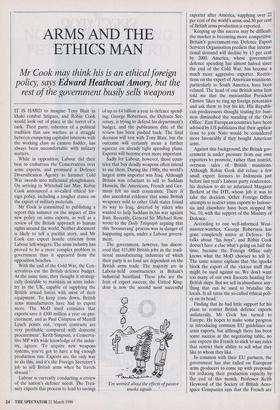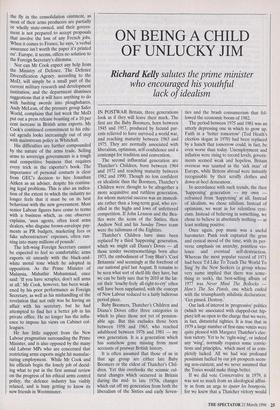ARMS AND THE ETHICS MAN
Mr Cook may think his is an ethical foreign
policy, says Edward Heathcoat Amory, but the
rest of the government busily sells weapons
IT IS HARD to imagine Tony Blair in khaki combat fatigues, and Robin Cook would look out of place in the turret of a tank. Their party, inheritor of a political tradition that saw warfare as a struggle between competing capitalist interests with the working class as cannon fodder, has always been uncomfortable with military matters.
While in opposition, Labour did their best to embarrass the Conservatives over arms exports, and promised a Defence Diversification Agency to hammer Cold War swords into millennial ploughshares. On arriving in Whitehall last May, Robin Cook announced a so-called ethical for- eign policy, including a tougher stance on the export of military materials.
Mr Cook is committed to publishing a report this summer on the impact of this new policy on arms exports, as well as a review of the British approach to human rights around the world. Neither document is likely to tell a pacifist story, and Mr Cook can expect hostile criticism from Labour left-wingers. The arms industry has proved to be a more complex problem in government than it appeared from the opposition benches.
With the end of the Cold War, the Con- servatives cut the British defence budget. At the same time, they thought it strategi- cally desirable to maintain an arms indus- try in the UK, capable of supplying the British armed forces with most of their equipment. To keep costs down, British arms manufacturers have had to export more. The MoD itself estimates that exports save it £300 million a year on pro- curement, and as Paul Compton of Merrill Lynch points out, `export contracts are very profitable compared with domestic procurement'. Keith Simpson, a Conserva- tive MP with wide knowledge of the indus- try, agrees: 'To acquire new weapons systems, you've got to have a big enough production run. Exports are the only way to do this, and it's the Foreign Secretary's job to sell British arms when he travels abroad.'
Labour is currently conducting a review of the nation's defence needs. The Trea- sury expects this process to lead to savings of up to £4 billion a year in defence spend- ing. George Robertson, the Defence Sec- retary, is trying to defend his department's budget, and the publication date of the review has been pushed back. The final decision will rest with Tony Blair, but the outcome will certainly mean a further squeeze on already tight spending plans. Exports will become even more important.
Sadly for Labour, however, those coun- tries that buy deadly weapons often intend to use them. During the 1980s, the world's largest arms importer was Iraq. Although Britain was reluctant to sell to Saddam Hussein, the Americans, French and Ger- mans felt no such constraints. There is also anecdotal evidence that some British weaponry sold to other Gulf states found its way to Iraq, diverted by rulers who wanted to help Saddam in his war against Iran. Recently, General Sir Michael Rose wrote to the Daily Telegraph arguing that this 'boomerang' process was in danger of happening again, under a Labour govern- ment.
The government, however, has discov- ered that 415,000 British jobs in the tradi- tional manufacturing industries of which their party is so fond are dependent on the British arms trade. The majority are in Labour-held constituencies in Britain's industrial heartland. These jobs are the fruit of export success; the United King- dom is now the second most successful I'm worried about the effects of passive smoke signals ... ' exporter after America, supplying over 22 per cent of the world's arms, and 30 per cent of British arms production is exported.
Keeping up this success may be difficult; the market is becoming more competitive. Britain's government-run Defence Export Services Organisation predicts that interna- tional demand will decline by 15 per cent by 2000. America, whose government defence spending has almost halved since the end of the Cold War, has become a much more aggressive exporter. Restric- tions on the export of American munitions, particularly to South America, have been relaxed. The head of one British arms firm told me that the mercantilist President Clinton 'likes to ring up foreign potentates and ask them to buy his kit. His Republi- can predecessors thought touting for busi- ness diminished the standing of the Oval Office.' East European countries have been advised by US politicians that their applica- tions to join Nato would be considered more favourably if they bought American arms.
Against this background, the British gov- ernment is under pressure from our own exporters to promote, rather than restrict, overseas sales of British munitions. Although Robin Cook did refuse a few small export licences to Indonesia just before last year's Labour party conference, his decision to do so infuriated Margaret Beckett at the DTI, whose job it was to take the decision. Other Foreign Office attempts to restrict arms exports to Indone- sia and elsewhere have been stopped by No. 10, with the support of the Ministry of Defence.
According to one well-informed West- minster-watcher, 'George Robertson has gone completely native at Defence. He talks about "his boys", and Robin Cook doesn't have a clue what's going on half the time, because the Foreign Office only knows what the MoD chooses to tell it.' The same source explains that 'the spooks block the export of the vicious stuff that might be used against us. We don't want too many of our own Exocets heading for British ships. But we sell in abundance any- thing that can be used to brutalise the locals. It all turns the so-called ethical poli- cy on its head.'
Finding that he had little support for his plans to restrict British defence exports unilaterally, Mr Cook has turned to Europe. He hopes to make some progress in introducing common EU guidelines on arms exports, but although there has been some success at the negotiating table, no one expects the French to stick to any rules that restrict their ability to sell what they like to whom they like.
In common with their EU partners, the government has also called on European arms producers to come up with proposals for reducing their production capacity by the end of this month. Professor Keith Heywood of the Society of British Aero- space Companies says that the French are the fly in the consolidation ointment, as most of their arms producers are partially or wholly state-owned, and their govern- ment is not prepared to accept proposals that involve the loss of any French jobs. When it comes to France, he says, 'a verbal assurance isn't worth the paper it's printed on'. Europe, it seems, offers no solution to the Foreign Secretary's dilemma.
Nor can Mr Cook expect any help from the Ministry of Defence. The Defence Diversification Agency, according to the MoD, will simply be a small part of the current military research and development institution, and the department dismisses suggestions that it will have anything to do with bashing swords into ploughshares. Andy McLean, of the pressure group Safer World, complains that last week the MoD put out a press release boasting of a 10 per cent increase in British arms exports. Mr Cook's continued commitment to his ethi- cal agenda looks increasingly out of step with mainstream policy in Whitehall. His difficulties are further compounded by the nature of the arms trade. Selling arms to sovereign governments is a tough and competitive business that requires every trick in the exporter's book. The importance of personal contacts is clear from GEC's decision to hire Jonathan Aitken as an adviser, despite his continu- ing legal problems. This is also an indica- tion of the extent to which the industry no longer feels that it must be on its best behaviour with the new government. Most senior Labour figures have come to terms with a business which, as one observer explains, 'uses agents, often local arms dealers, who disguise brown-envelope pay- ments as PR budgets, marketing fees or fake subcontractors' expenses, often run- ning into many millions of pounds'.
The left-wing Foreign Secretary cannot be expected to feel so comfortable; arms exports sit uneasily with the black-and- white moral tone which he adopted in opposition. As the Prime Minister of Malaysia, Mahathir Muhammad, once said: 'If you have scruples, don't sell arms at all.' Mr Cook, however, has been weak- ened by his poor performance as Foreign Secretary, as well as his mishandling of the revelation that not only was he having an affair with his secretary, but he had attempted to find her a better job in his private office. He no longer has the influ- ence to impose his views on Cabinet col- leagues.
He has little support from the New Labour pragmatists surrounding the Prime Minister, and is also opposed by the many old Labour MPs who are concerned that restricting arms exports might hit manufac- turing employment. While Mr Cook and his officials begin the lonely job of decid- ing what to put in the first annual review on the progress of his ethical arms control policy, the defence industry has visibly relaxed, and is busy getting to know its new friends in Westminster.





































































 Previous page
Previous page